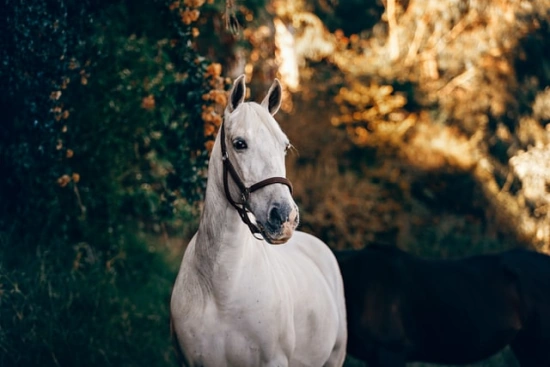1
Og Herrens ord kom til mig, og det lød så:
2
Menneskesønn! Fremsett en gåte for Israels hus og tal til dem i en lignelse
3
og si: Så sier Herren, Israels Gud: Den store ørn med de store vinger og de lange svingfjær, med full fjærham og brokete farver, kom til Libanon og tok bort toppen av sederen.
4
Den brøt av den øverste kvist og førte den til kjøbmannslandet og satte den i kremmerstaden*. / {* d.e. Babel; ESK 17, 12; 16, 27.}
5
Så tok den et skudd av landets vekster og satte det i en dyrket mark; den plantet det på et sted hvor det var meget vann; den satte det likesom et piletre.
6
Og det vokste op og blev til et vintre som bredte sig vidt ut, men var lavt av vekst, forat dets ranker skulde vende sig til den*, og dets røtter være under den. Og det blev til et vintre som satte grener og skjøt løvrike kvister. / {* d.e. til ørnen; ESK 17, 3.}
7
Men det var en annen stor ørn med store vinger og mange fjær, og se, vintreet bøide sine røtter bort imot den, og fra den seng hvori det var plantet, strakte det sine ranker bort til den, forat den skulde vanne det.
8
På en god mark, på et sted hvor det var meget vann, var det plantet, så det kunde skyte grener og bære frukt og bli et herlig vintre.
9
Si: Så sier Herren, Israels Gud: Skal det trives? Skal ikke dets røtter rykkes op og dets frukt rives av, så det tørker bort? Alle dets spirende blad skal tørke bort, og ikke med stor styrke og meget folk vil nogen kunne få det til å skyte op av sine røtter.
10
Se, det er plantet; skal det trives? Skal det ikke tørke bort, tørke aldeles bort, så snart østenvinden rører ved det? I den seng hvor det vokser, skal det tørke bort.
11
Og Herrens ord kom til mig, og det lød så:
12
Si til den gjenstridige ætt: Vet I ikke hvad dette er? Si: Se, Babels konge kom til Jerusalem og tok dets konge* og dets høvdinger og førte dem til sig i Babel. / {* Jojakin; 2KG 24, 10. 15. 2K
36, 9. 10.}
13
Og han tok en av kongeætten* og gjorde en pakt med ham og tok ham i ed, og de mektige i landet tok han med sig, / {* Sedekias; 2KG 24, 17. 2K
36, 10 fg.}
14
forat det skulde være et ringe kongerike og ikke ophøie sig, men holde pakten med ham og bli stående.
15
Men han falt fra ham og sendte sine bud til Egypten, forat de skulde gi ham hester og meget folk. Skal han ha fremgang? Skal den som gjør slikt, slippe unda? Skal han kunne bryte en pakt og slippe unda?
16
Så sant jeg lever, sier Herren, Israels Gud, på det sted hvor han bor den konge som gjorde ham til konge, men hvis ed han foraktet, og hvis pakt han brøt, hos ham, midt i Babel skal han visselig dø.
17
Og ikke skal Farao med en stor hær og meget folk komme ham til hjelp i krigen, når det kastes op en voll og bygges skanser for å utrydde mange liv.
18
Han foraktet eden og brøt pakten, enda han hadde gitt hånden på det. Alt dette har han gjort; han skal ikke slippe unda.
19
Derfor sier Herren, Israels Gud, så: Så sant jeg lever, eden som han svor ved mig, men allikevel foraktet, og pakten som han gjorde med mig, men allikevel brøt, den vil jeg visselig la komme over hans hode.
20
Jeg vil utspenne mitt garn over ham, og han skal fanges i mitt nett, og jeg vil føre ham til Babel og gå i rette med ham der, for den troløshet som han har vist mot mig.
21
Og alle flyktninger fra alle hans krigsskarer skal falle for sverdet, og de som blir igjen, skal spredes for alle vinder, og I skal kjenne at jeg, Herren, har talt.
22
Så sier Herren, Israels Gud: Da vil jeg ta en kvist av den høie seders topp og sette; av dens øverste kvister vil jeg bryte av et spett skudd, og jeg vil sette det på et høit, høit fjell.
23
På Israels høie fjell vil jeg plante det, og det skal skyte grener og bære frukt og bli til en herlig seder, og alle slags fugler, alt som har vinger, skal bo under det; i skyggen av dets grener skal de bo.
24
Og alle markens trær skal kjenne at jeg, Herren, har gjort et høit tre lavt og et lavt tre høit, et friskt tre tørt og et tørt tre grønt; jeg, Herren, har sagt det, og jeg skal gjøre det.







